What To Do If You See Someone Upcoding For Insurance?
Most people know that there are scams we must watch out for in today's world There are phone scams, email scams, and more. What we don't think about is insurance scams perpetrated by our doctors, but it happens. Do you know ?
DoNotPay has the answers to your questions regarding upcoding and health care fraud. We can tell you how to handle it if you suspect that your doctor or hospital is overcharging Medicare for their services.
What Is Upcoding and Why It Happens More Often Than You Think
Anytime that you visit your doctor or any type of healthcare facility, there are codes used to indicate what they did for you. If you're a new patient, then it will be one five-digit CPT code. Established patients get a different CPT code. If they do routine blood draws, then it will have one code and emergency draws will be another.
In each of these situations, there will be a price variation. This variation in price is where discrepancies sometimes come into play. It happens when a doctor assigns the wrong code to your visit with them.
Sometimes, it may be a simple human error. In others, it can be something more malicious. Determining which one it is isn't easy since there are so many types of insurance scams or fraudulent claims.
Type of Medicare Scams and Fraud
There are about 7,800 codes. This makes it easy for mistakes to happen. The problem occurs when the mistakes are not made in error, but to get insurance to pay more.
Some of the most common types of insurance fraud are:
Upcoding or Unbundling
To get more money, a healthcare physician may put codes on the claim. They usually do it to get more money from state or federally funded insurances, like Medicare or Medicaid.
Some services that you receive are bundled together in how they're coded. For instance, when you have surgery, recovery is an expected part of it. Some physicians may unbundle those services to get more money.
Double Billing or Phantom Billing
Phantom billing occurs when your doctor puts coded claims down for procedures and services that you never received. For instance, claiming that you had lab work done when you didn't, or contrast during your CT when you didn't have it.
As the name implies, double billing happens when your doctor charges twice for the same thing. It can be two charges for the same day or a different day.
These medical fraud types do not negatively affect you, but this isn't the case with other fraudulent things a doctor may do. Some doctors may also:
- Chase Kickbacks: They can often get compensation for encouraging you to use specific medications, allowing them to make money from Medicaid and pharmaceutical companies.
- Providing Unnecessary Services: Your physician may suggest testing and procedures that you don't need to get more money. You may not need these tests or procedures.
- Failure to Document: Your doctor must keep notes about what your medical issues are and what services they have provided. Without documentation of it, it never happened.
Doctors, like others, want more money. Sometimes, the things they do negatively affect your health and well-being. At other times, the negative impacts are more distant. By scamming Medicare to get more money from the government, someone else may have to go without Medicare due to a lack of funding.
Uncovering Fraud in Medical Billing: Who Is Responsible for It?
Health care fraud is a huge problem. Some estimate that fraudulent billing claims account for roughly $230 billion per year. To lower the risk of accidental fraud, there are some health care fraud prevention tips for facilities. They are listed as part of a compliance program.
The compliance program offers ways that can lower the risk of fraudulent accidents. As a facility, you should implement the parts of it that you feel are necessary to protect your clinic or hospital.
These compliance components are:
- Training and Education for All Who Work in Your Facility
- Talking Openly About Compliance Issues, Concerns, and/or Education
- Keeping Written Policies, Procedures, and/or Standards of Conduct
- Reporting Misconduct Quickly if Detected
- Discipline for Anyone Caught Committing Fraud
To do more to protect your healthcare facility from fraudulent activities, you must cover all the bases.
So, What Do You Do if You See Someone Upcoding?
As an individual or a patient, there are things you can do to lower the risk that you will be a victim of Medicare fraud. Some of the best things include:
- Shredding old cards and protecting the information on new cards
- Never share your Medicare number except with your doctor
- Know that Medicare will never send medical supply representatives to your home
- Keep track of appointments, procedures, etc., so you can cross-check bills
- Be cautious if your doctor pushes certain medications when alternatives are available
If you discover that you have been caught in Medicare fraud, whether upcoding or some other tactic was used, there are things you should do. The first thing is to contact your doctor about your concerns. If they cannot take your concern seriously, you will need to contact:
| Your State’s Health Department | Report Medicare fraud |
| U.S. Department of Health and Human Services | Submit a Hotline Complaint | Office of Inspector General | Government Oversight | US Department of Health and Human Services |
| FBI | FBI - Tips |
| Medicare Office | Reporting Medicare fraud & abuse |
| Centers for Medicare and Medical Services | Reporting Fraud | CMS |
When you contact these entities, they will tell you how to proceed. The problem is that their processes are often long, drawn-out processes. It may take several phone calls and months of waiting for results. Who has time for that?
If you would rather not waste your valuable time by trying to go after a fraudulent healthcare provider, DoNotPay has an easier option. We can do the tough stuff for you!
DoNotPay Can Help You Handle Cpt Code Fraud Reporting
Even if it doesn't seem like it, CPT code fraud is an issue that affects us all. If you get notified of medical procedures being charged to your insurance company that you do not remember having done, report it. DoNotPay can help you find the correct CPT code and write a demand letter for bill correction. And should your doctor or health care provider not resolve this issue, with DoNotPay’s Send Demand Letters To Now product, we can help you begin a small claims lawsuit against the hospital/health care provider.
DoNotPay makes it easy! With our help and our Fight Medical Fraud product, you can file your complaint in just a few easy steps. To get started, you simply need to:
- Search Fight Medical Fraud on DoNotPay.
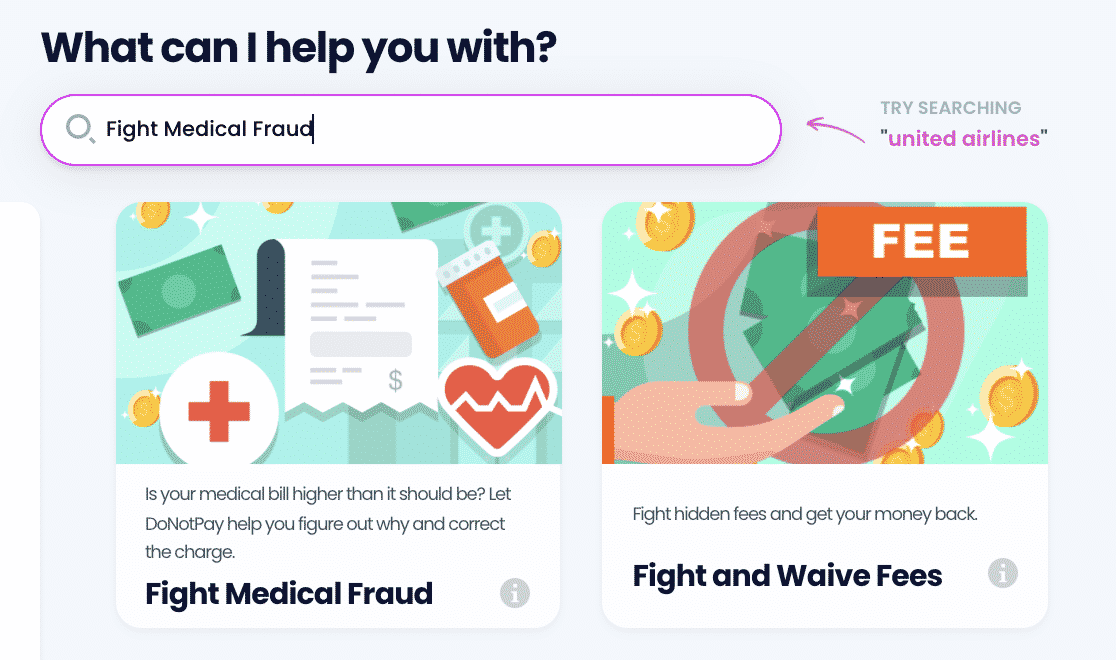
- Tell us the date of your visit, what you were treated for, and where you were treated.
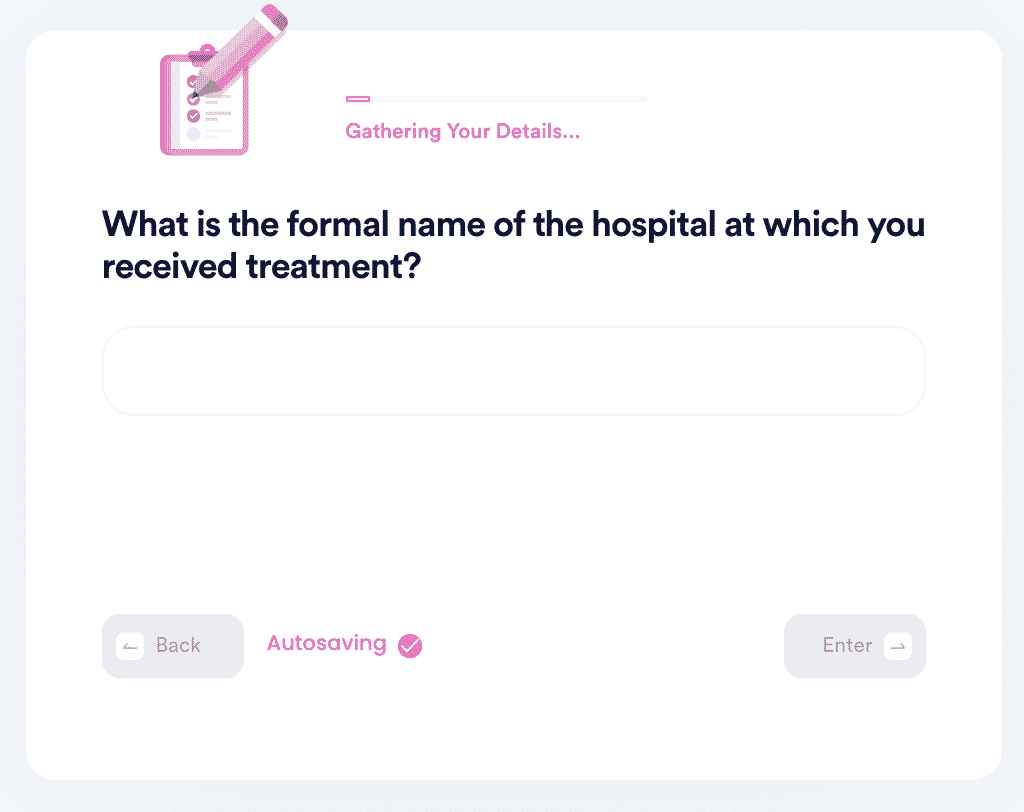
- Let us know what CPT code your visit was filed under. If you don't know, we'll generate a letter for you to send to your physician to request the code.
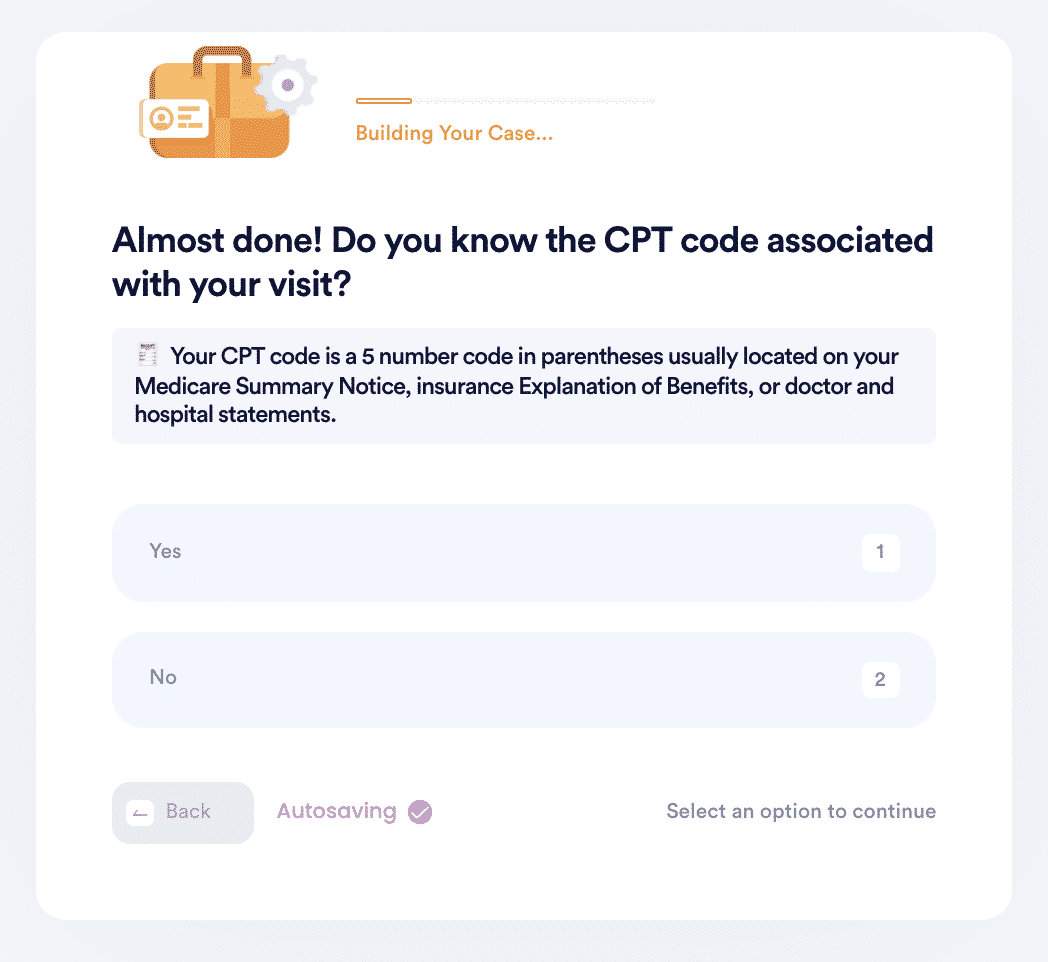
- Choose the correct CPT code or let us know if you want us to find it for you.
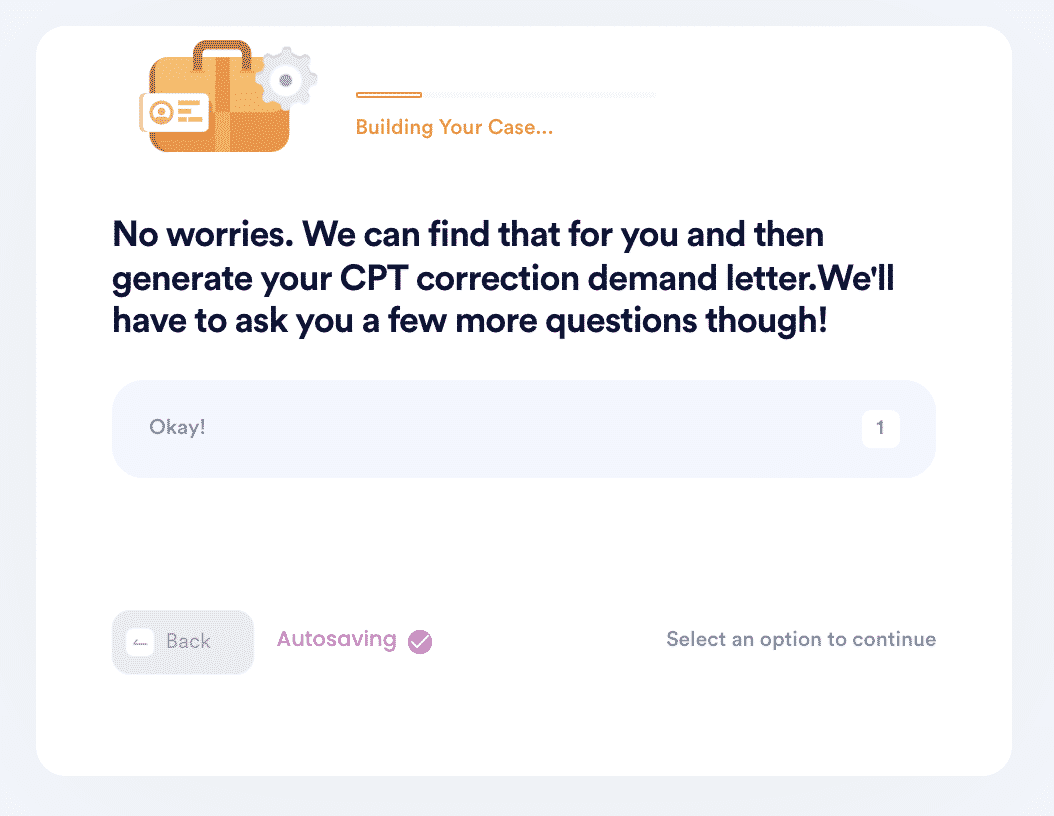
- And that's it! DoNotPay will automatically find the correct CPT code for your visit if you don't know it and then generate a demand letter on your behalf to send to your physician for a bill correction.
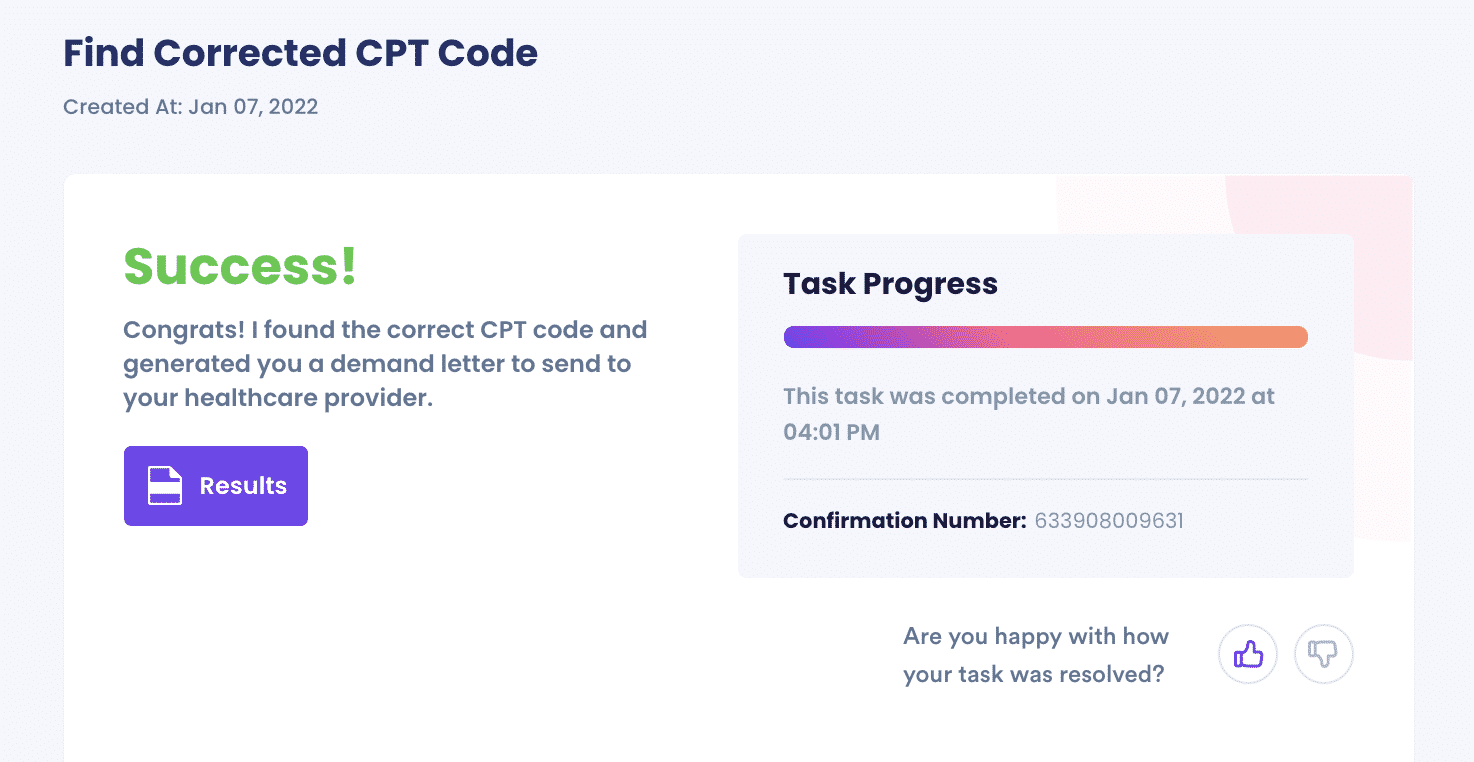
That's it! We will take care of everything else on your behalf.
Other Ways That DoNotPay Can Assist You Medically
DoNotPay makes it simple to know , but that isn't all we can do for you. We offer a large variety of services. We can also help you:
- Request Sick Leave
- Deal with Bills
- Discover Places to Donate Plasma
- Create Health Care Directives
- Locate Copies of Birth Certificates
Our services extend into all areas, both medical and non-medical. All you must do is visit DoNotPay online, and we will help you handle anything that complicates your life.


